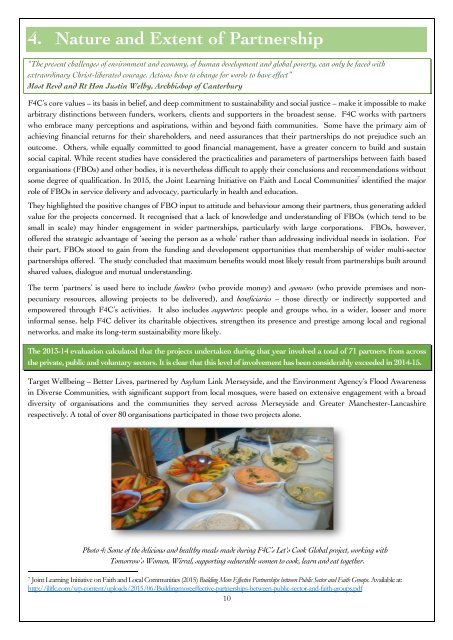Programme Evaluation 2014-15
Create successful ePaper yourself
Turn your PDF publications into a flip-book with our unique Google optimized e-Paper software.
4. Nature and Extent of Partnership<br />
“The present challenges of environment and economy, of human development and global poverty, can only be faced with<br />
extraordinary Christ-liberated courage. Actions have to change for words to have effect”<br />
Most Revd and Rt Hon Justin Welby, Archbishop of Canterbury<br />
F4C’s core values – its basis in belief, and deep commitment to sustainability and social justice – make it impossible to make<br />
arbitrary distinctions between funders, workers, clients and supporters in the broadest sense. F4C works with partners<br />
who embrace many perceptions and aspirations, within and beyond faith communities. Some have the primary aim of<br />
achieving financial returns for their shareholders, and need assurances that their partnerships do not prejudice such an<br />
outcome. Others, while equally committed to good financial management, have a greater concern to build and sustain<br />
social capital. While recent studies have considered the practicalities and parameters of partnerships between faith based<br />
organisations (FBOs) and other bodies, it is nevertheless difficult to apply their conclusions and recommendations without<br />
some degree of qualification. In 20<strong>15</strong>, the Joint Learning Initiative on Faith and Local Communities 7 identified the major<br />
role of FBOs in service delivery and advocacy, particularly in health and education.<br />
They highlighted the positive changes of FBO input to attitude and behaviour among their partners, thus generating added<br />
value for the projects concerned. It recognised that a lack of knowledge and understanding of FBOs (which tend to be<br />
small in scale) may hinder engagement in wider partnerships, particularly with large corporations. FBOs, however,<br />
offered the strategic advantage of ‘seeing the person as a whole’ rather than addressing individual needs in isolation. For<br />
their part, FBOs stood to gain from the funding and development opportunities that membership of wider multi-sector<br />
partnerships offered. The study concluded that maximum benefits would most likely result from partnerships built around<br />
shared values, dialogue and mutual understanding.<br />
The term ‘partners’ is used here to include funders (who provide money) and sponsors (who provide premises and nonpecuniary<br />
resources, allowing projects to be delivered), and beneficiaries – those directly or indirectly supported and<br />
empowered through F4C’s activities. It also includes supporters: people and groups who, in a wider, looser and more<br />
informal sense, help F4C deliver its charitable objectives, strengthen its presence and prestige among local and regional<br />
networks, and make its long-term sustainability more likely.<br />
The 2013-14 evaluation calculated that the projects undertaken during that year involved a total of 71 partners from across<br />
the private, public and voluntary sectors. It is clear that this level of involvement has been considerably exceeded in <strong>2014</strong>-<strong>15</strong>.<br />
Target Wellbeing – Better Lives, partnered by Asylum Link Merseyside, and the Environment Agency’s Flood Awareness<br />
in Diverse Communities, with significant support from local mosques, were based on extensive engagement with a broad<br />
diversity of organisations and the communities they served across Merseyside and Greater Manchester-Lancashire<br />
respectively. A total of over 80 organisations participated in those two projects alone.<br />
Photo 4: Some of the delicious and healthy meals made during F4C’s Let's Cook Global project, working with<br />
Tomorrow’s Women, Wirral, supporting vulnerable women to cook, learn and eat together.<br />
7 Joint Learning Initiative on Faith and Local Communities (20<strong>15</strong>) Building More Effective Partnerships between Public Sector and Faith Groups. Available at:<br />
http://jliflc.com/wp-content/uploads/20<strong>15</strong>/06/Buildingmoreeffective-partnerships-between-public-sector-and-faith-groups.pdf<br />
10


